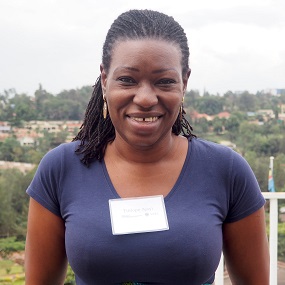Bio
Titilope Ajayi is a PhD Candidate at the Legon Centre for International Affairs and Diplomacy (LECIAD), University of Ghana. A feminist researcher and writer on security and civil society, she has held appointments as head of research at the West Africa Civil Society Institute (WACSI) and fellow/West Africa analyst with the International Crisis Group (ICS). Ajayi founded and coordinates Doing A PhD in Africa (www.doingaphdinafrica.org) and also works as an independent copyeditor. She was a Next Gen Dissertation Proposal Fellow (2017) and an African Peacebuilding Network Individual Grant recipient (2018).
Her latest publications include:
The Postponement of Nigeria’s 2019 Elections: Is Democracy on Hold? Kujenga Amani, 22 February 2019.
(2018) Peppering Patriarchy: Re-imagining/Re-making Femaleness in Ghana through Social Media, The CIHA Blog, Conference Paper presented at the African Studies Association annual meeting, Chicago, 15–19 November 2017.

